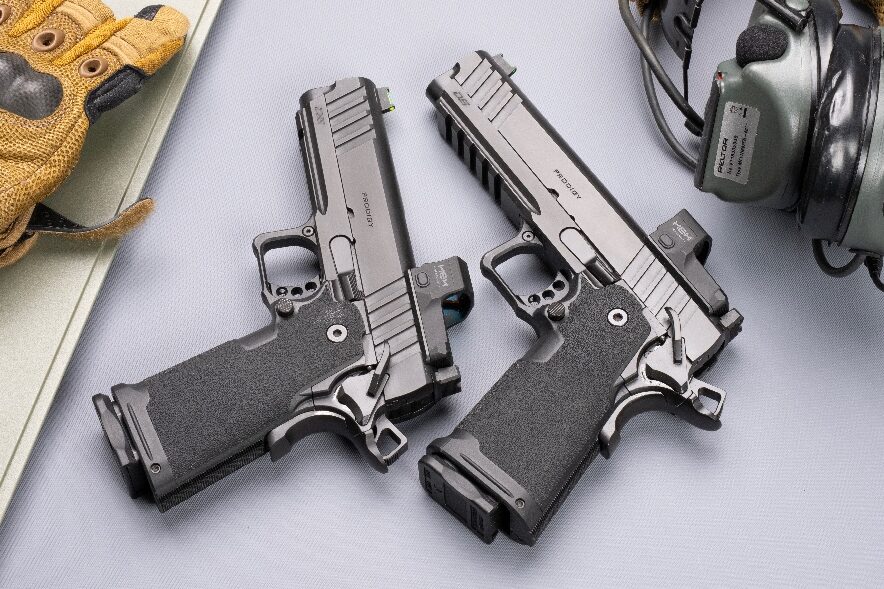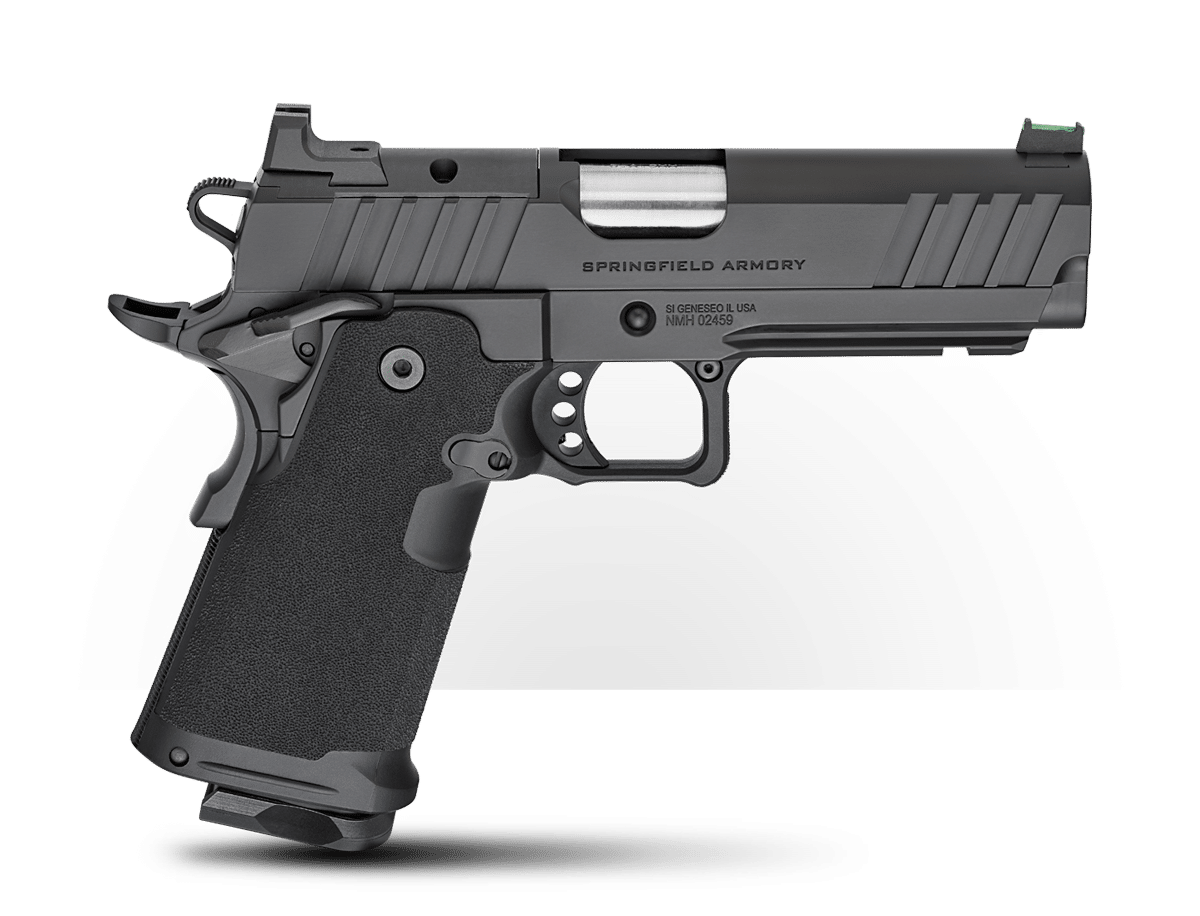Unfortunately, the political reality these days is that many American shooters face misguided and pointless capacity restrictions on the magazines of their firearms. Law-abiding residents of states such as California, Connecticut, Maryland, Massachusetts and more restrict magazine capacities to 10 rounds, unfairly making many of today’s most popular firearms off-limits for them.
Springfield Armory has not forgotten them and offers many of its products in restricted-locale configurations. The latest is the 1911 DS Prodigy.
What Is the Prodigy?
The Springfield 1911 DS Prodigy is a semi-automatic pistol that bridges the gap between the classic 20th-century 1911 design and 21st-century modernity. The goal is to give shooters of all backgrounds the best of both worlds.

At its core, the Prodigy is a single-action pistol chambered for the 9x19mm Parabellum cartridge. Also known as the 9mm Luger, the cartridge is the most popular handgun round in the United States. It offers a balance of power and manageable recoil, making it a good choice for home defense, duty carry and recreational shooting.
[Don’t miss Paul Carlson’s Springfield Prodigy Review.]
As I mentioned at the beginning of this article, Springfield Armory is now making 10-round magazines for the Prodigy pistols. The low-capacity magazine models are available now and can be had in both the 5” and 4.25” variants of the Prodigy. Additional 10-round magazines are also sold separately.
The Features
True to its 1911 heritage, the 10-round versions of the Prodigy are single-action handguns that provide the crisp, clean trigger pull all 1911 aficionados appreciate.

As with many single-action pistols, the Prodigy uses a thumb safety. Springfield Armory caters to both right and left-handed shooters by including an ambidextrous safety lever that can be accessed from either side of the 1911 DS.
Red Dots Welcome
Another modernization feature of the 1911 DS is that it is optics-ready out of the box. Springfield Armory uses the Agency Optics System (AOS) — a standard optics mounting system that uses plates to adapt a wide range of red dot sights to the pistols.

Prodigy pistols ship with a steel plate for the Springfield Standard Footprint. The mounting pattern covers a variety of optics including the HEX Dragonfly, Vortex Venom and Burris Fastfire. Catch Paul Carlson’s HEX Dragonfly review for additional information on that red dot.
Other steel plates are available for all major optics including the Trijicon RMR, Leupold DeltaPoint Pro, Aimpoint ACRO and Holosun sights. In addition, the plate features a rear sight designed to co-witness through the vast majority of red-dot optics on the market (you can see a full chart here). The Prodigy also comes with a slide cover plate for those who prefer to run just iron sights.
Up front, Springfield Armory chose to mount a green fiber optic sight that is bright in a wide range of lighting conditions. In back is a blacked-out U-notch rear sight that virtually eliminates any visual confusion when getting on a target fast.
Accuracy and Precision
Many shooters prefer the 1911 platform for its ease of accurate shooting. John M. Browning’s classic design has seen its share of precision shooting — from the race guns at the highest levels of competitive sports to the precision guns built for SWAT teams and military special operations troops. The 1911 DS follows in those footsteps.

To start with, the single-action trigger is smooth and crisp. You will not have a long drag of a dull trigger that pulls your muzzle one way or the other. Simply align the sights and press the trigger straight back.
Springfield Armory uses match-grade bull barrels in the Prodigy. Barrels are forged stainless steel. Two models are available: one uses a 4.25” barrel while the other has a 5” long barrel. Both lengths are optimized for accuracy and long life. Springfield finishes each barrel with an 11˚ crown.
Polymer — The Ultimate 1911 Modernization?
The 1911 design comes from an era of steel guns. Pistols were made of metal, and the use of polymers were the stuff of science fiction. Nevertheless, as material science progressed, polymers became a more common material in firearms of all kinds.

The 1911 DS features a polymer grip module. This modern touch enhances ergonomics and reduces overall weight. Additionally, the grip module has an aggressive texture to help cement the gun into your hand. This helps immensely when sweat, blood or rain acts as a lubricant on your hands. This grip module attaches to the pistol’s forged steel frame, that also features a strip of Picatinny rail.
All the Extras
The Springfield Prodigy has a plethora of additional features that were not on the original M1911 pistols. The slide, for example, has deep cocking serrations on the front and rear. Much like the grip texture, these help you get a positive grasp on the slide.

Springfield purposely designed the handgun to work with a multitude of modern accessories. The use of the Agency Optic System is one such example. Another is the inclusion of the Picatinny rail.
The Picatinny rail is a standard-sized accessory rail that is completely compatible with all kinds of attachments. For example, you can add a SureFire X300 Turbo or a Streamlight TLR-1 HL weaponlight to the Prodigy. Likewise, a laser could also be attached to the accessory rail.
Final Thoughts
The Springfield Armory 1911 DS Prodigy is an exceptional 9mm pistol. Now that the company is making 10-round magazines for the handgun, the Prodigy is available to more law-abiding citizens. MSRP for both models is $1,499, and the pistols come packed with two 10-round magazines.
Editor’s Note: Be sure to check out The Armory Life Forum, where you can comment about our daily articles, as well as just talk guns and gear. Click the “Go To Forum Thread” link below to jump in!
Join the Discussion
Featured in this article
Read the full article here



